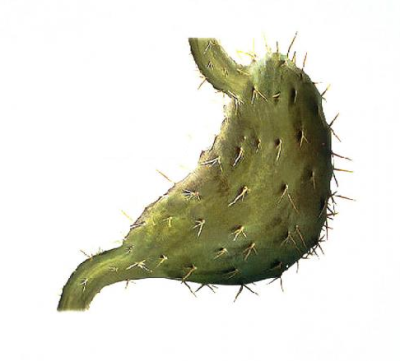Indigestion
 Overview
Overview
Most people will suffer from indigestion (also known as dyspepsia) at some point in their lifetime. This condition is typified by pain or discomfort in the chest or upper abdomen after eating.
The stomach produces a strong acid that helps the body digest food. A layer of mucous lines the stomach to act as a barrier against this acid, but if the lining becomes damaged the acid is able to irritate the tissues underneath causing indigestion.
Causes
This condition tends to occur mainly after a person has consumed a heavy meal or has been eating late at night or eating irregularly. Long gaps between meals allows the acid to have time to act on the body. While most people will eat a very large meal and suffer from indigestion, this condition can also be caused by:
- Abusing alcohol
- Smoking
- Stress and anxiety
- Drug use
- Aspirin and anti-inflammatory medications
- Stomach ulcers
- Pregnancy
Symptoms of Indigestion
The typical symptoms of indigestion include:
- Pain in the chest or upper part of the abdomen
- Heartburn, which is a burning pain caused by the stomach's contents becoming reflux up the gullet
- Loss of appetite
- Vomiting and nausea
- Belching or flatulence
Prevention
The treatment goal for indigestion is to make lifestyle changes that will reduce the long-term occurrence of this condition and to relieve the immediate symptoms of discomfort and burning.
Diagnosis
Before a proper course of treatment can be prescribed, the cause of the indigestion should be found. The initial diagnosis can be made by undergoing a procedure called endoscopy, where a tube is inserted through the mouth to view the oesophagus and the stomach. This is the typical course of action for patients who are 45 years old or older. For those under 45, tests are done to see if the bacteria H. Pylori (often associated with ulcers) is present.
Treatment
If H. Pylori is present, treatment typically involves using an H2 blocking agent or a proton pump inhibitor. These drugs block the production of acid in special cells which are found in the stomach wall's lining. Eliminating wheat and dairy products from the diet may help the symptoms of indigestion.
Stress reduction techniques such as deep breathing and meditation may also be helpful for this condition.
Some natural treatments to try include:
- Chamomile - While drinking chamomile tea is a good treatment, the tincture can be more effective. This is because the tea has only 10 to 15 percent of the herb's carminative essential oil, while tinctures prepared with 100-proof alcohol have much more.
- Peppermint - Many herbalists have a special affinity for peppermint and its ability to relieve indigestion. Although peppermint tea is effective for treating indigestion, mint juleps are also good choices. This is because most of the carminative oils in peppermint and other mints are somewhat insoluble in water. As a result, tea does not contain much of the plant's soothing constituents, but tinctures, which are made with alcohol, contain more.
- Angelica root - This plant is good for treating indigestion, lack of appetite and mild stomach cramps. The suggested daily dose is a tea that is made with two or three teaspoons of dried herb per cup of boiling water, or up to one teaspoon of tincture.
- Ginger - This herb is very beneficial for motion sickness and nausea, so it is not surprising that it also works well for indigestion. Ginger contains chemicals that not only sooth the stomach but actually aid digestion by increasing the "wavelike" muscle contractions that move food through the intestine.
- Marjoram - Munching on marjoram sandwiches is an old British remedy to treat indigestion. use diluted marjoram tea to relive colic in infants. Because marjoram is an aromatic mint, it has the same digestion-soothing qualities that are present in peppermint.
- Coriander - The essential oils found in coriander are carminative, antiseptic, bacterial, fungicidal and a muscle relaxant. Some herbalists use coriander to counteract the stomach-upsetting properties of laxative herbs such as rhubarb, senna, buckthorn and cascara.
- Papaya and pineapple - Both of these fruits contain enzymes that help to break down protein. Some herbalists maintain that papaya and pineapple juice help indigestion. Kiwi fruit and figs should have similar effects.
- Red chilli pepper - While Americans usually believe red chilli peppers upset the stomach, much of the rest of the world think red chilli pepper stimulates digestion.
References
- Bratman, S. The Alternative Medicine Ratings Guide: an expert panel rates the best treatments for over 80 conditions, Prima Health A Division of Prima Publishing (1998)
- Brown, L. Alternative Medicine, NTC/Contemporary Publishing (1999)
- Deepak Chopra, M.D. Alternative Medicine: The Definitive Guide, Celestial Arts (2002)
- Servan-Schreiber, D. The Encyclopedia of New Medicine: Conventional & Alternative Medicine For All Ages, Rodale International Limited (2006)
Posted in Indigestion
Ask a Question Or Join a Discussion


